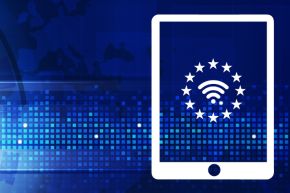EU – Baltic States, Good for Business, Innovations, Markets and Companies, Technology
International Internet Magazine. Baltic States news & analytics
Thursday, 01.01.2026, 03:59
Business goes digital: innovative opportunities
 Print version
Print version
According to Carlos Moedas, European Commissioner for research, science and innovation, in the transition from traditional business to the digital one, three things are important: changing the way business is done through digitalisation; calculating risks implied in adjusting to modern challenges; and using in full innovative opportunities.
Innovative opportunities
 |
|---|
= In the digital age, data and communication increasingly underpin global trade and commerce. The internet enables instant cross-border communication: technical entrepreneurs, universities, artists, etc. all now has multiple entry points into global markets.
Presently, open-source software or mobile application can challenge traditional markets. Thus, every business is physical and every business is digital.
According to the McKinsey Global Institute's 2014 report on Global flows in a digital age, digital is exercising ever more influence on global GDP growth. Digital technologies are not only changing the way business is done; they create entirely new kinds of business, whether improving services, making them more accessible, or digitalising them entirely.
The digital “agenda” is making market access more open and democratic, while speeding up the movement of information goods and services at an exponential rate; there is no way to slow this down, argued Commissioner Carlos Moedas.
In Accenture's Technology Vision 2015 survey, 60% of respondents said they plan to engage new digital partners within their respective industries over the next two years.
The transformation is already underway: there is only one choice, i.e. to take advantage of this new way of thinking, working and innovating.
= Risks involved in the transition from “regular” business to the digital one could be great. However, governments can no longer ignore the digital effect in four areas vital to modern development: health, food, water and energy.
Digital markets’ influence brings with it simpler, more accessible, more affordable options to citizens and consumers. However, the EU member states have to take a leading position on solutions to the digital age problems, before they are solved by others.
According to the Commissioner, failing to act could lead to the following risks: losing pace, while the rest of the world moves on; having obsolete business models, and being left vulnerable every time there's a new economic shock.
= Opportunities to innovate better in all walks of life: citizens can now engage in online democratic processes (from live-streaming political debate, to participating in public consultations), consumers can demand better service, by favouring digital business models that improve customer experience), researchers and academics can tap into unprecedented amounts of information and review their research results among a global community of peers, and patients in a remote village can now consult a doctor at the tap of an app.
The possibilities are endless and they're already transforming European societies. Digital is changing the process of innovation: from top-down to bottom-up − from the company to the citizen.
Virtually every aspect of human experience can be improved through digitalisation: it is compelling openness and that's a recipe for better, higher kinds of innovation based on European values.
Economic effect of digitalisation
The vision behind the EU Digital Single Market is to move from 28 markets to a single European one. A fully functional Digital Single Market could contribute as much as €415 billion per year to European economy and create hundreds of thousands of new jobs.
For example, in research, science and innovation there are 3 priorities: open innovation, open science and “open to the world”.
In the European Open Science Agenda, the idea is to consider developing of a European Open Science Cloud through the removal of legal barriers to Open Science and Open Innovation; particularly regarding the use of Text and Data Mining (TDM) techniques for scientific activities and supporting further digitalisation of European industry. Important is to merge the digital and the physical “world” in the EU Horizon 2020 programs, as well as to go from observing the influence of the digital age, to experimenting with it and further shaping it.
The “ultimate digitalisation” progress cannot come from politicians alone; it must evolve organically from peoples’ needs and aspirations. It must start with the vision citizens want for their future: only then can people transform the EU digital policy and strategy in a lasting and effective way.
For example, business has to make its vision for the digital age in Europe known; companies have to take a keen interest in how the Digital Single Market develops in the areas that matter most.
Regardless of optimism surrounding European “digital enterprise” and numerous new initiatives, business is still in its digital adolescence, argued the Commissioner. Hence, the need for the EU development to mature into a digital continent using global forces in digital innovation.
The Commissioner concluded with an optimistic note: “Europe's perspective is to find solutions others can't in researching digital, investing while building momentum!”
Reference: European Commission, speech “Innovation potential in the digital age” by Commissioner Moedas, responsible for Research, Science and Innovation, at the conference “ICT 2015: Innovate, Connect, Transform”. Lisbon, 21 October 2015. In:
http://europa.eu/rapid/press-release_SPEECH-15-5887_en.htm?locale=en








 «The Baltic Course» Is Sold and Stays in Business!
«The Baltic Course» Is Sold and Stays in Business!

